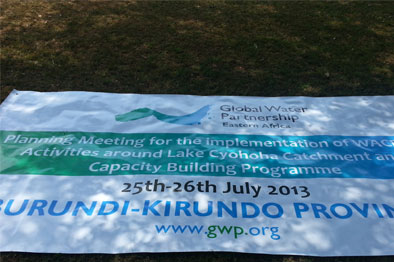In Eastern Africa, WACDEP will be implemented: at River Basin level- Kagera basin, at country level-Burundi and Rwanda, and at catchment/community level- Bugesera trans-boundary catchment—Lake Cyohoha—shared by the two countries.
In January 2009 AMCOW requested GWP to support the implementation of the 2008 African Union Sharm el-Sheikh Declaration on Water and Sanitation. In response, WACDEP was developed. In November 2010, during the 3rd Africa Water Week, the extra-ordinary session of the AMCOW adopted a decision recommending that the GWP and partners operationalize the WACDEP.
Initially, WACDEP will be implemented in eight countries: Ghana, Burkina Faso, Mozambique, Zimbabwe, Burundi, Rwanda and Tunisia; and four river basins: Volta Basin, Lake Chad, Lake Victoria-Kagera, and Limpopo Basin.
WACDEP: Objectives
The overall objective of WACDEP is to support integration of water security and climate resilience in development planning and decision making processes, through enhanced technical and institutional capacity and predictable financing and investments in water security and climate change adaptation.
The expected outcomes of the programme in Eastern Africa are:
- Water security and climate resilience integrated in development planning and decision-making processes in East Africa Community, Lake Victoria Basin Commission, and Burundi and Rwanda;
- Capacities of partnerships, institutions and stakeholders in Burundi and Rwanda enhanced to integrate water security and climate resilience in development planning and decision-making processes.
- No regrets” investment and financing strategies for water security, climate resilience and development formulated and governments of Burundi and Rwanda begin to implement them;
- Climate adaptation and water resources management plan developed for Bugesera catchment;
- Community-based climate adaptation and water security actions defined and implemented for demonstration or piloting purposes in Bugesera catchment;
- Useful knowledge and information on climate resilience and water security generated and disseminated among stakeholders in Eastern Africa
The impact of the program in Eastern Africa is that “a higher level of water security and climate resilience achieved in the countries of Burundi and Rwanda and in the communities of the Bugesera trans-boundary catchment.”
Projects
Adapting to Climate Change induced Water Stress in the Nile River Basin
The "Adapting to climate change induced water stress in the Nile River Basin" project was launched in March 2010 as a partnership between UNEP, GWP Eastern Africa and the Nile Basin Initiative (NBI). It was sponsored by SIDA.
Project Background:
The Nile River Basin is shared by 10 river basin countries hosting about 40% of Africa's population. Due to its size and varying climate and topographies, the Nile Basin constitutes one of the most complex river basins.
The challenges emanating from climate change in the Nile Basin include: uncertainty in precipitation and river flow, land degradation, reduced river flow, floods, siltation, waterweed infestation, wetland degradation, droughts, deforestation, loss of species and ecosystems and increased incidence of disease.
Project Goal:
The overall project goals is to build the resilience of ecosystems and economies that are most vulnerable to climate change induced water stress in the Nile Basin countries through building key adaptive capacity and piloting adaptation in "hotspots" with technical, policy and financial interventions.
Project implementation
The project will be focused on engaging all the Nile Basin countries in the collection of relevant data, mapping of 'hot spots' within the basin and defining adaptation options at national, sub-national and local levels.
Implementation will be in four discrete but inter-dependent work packages led by UNEP with various collaborating organizations.
- WPI: Comprehensive Assessments:
- WP2: Policy Support and Capacity Building
- WP3: Demonstration at field/site level
- WP4: Communication, awareness and media
GWP Eastern Africa, in collaboration with NBI, is involved in Work Package 2: Institutional and policy support to countries. The Work Package 2 aims to build the capacities of government agencies, research institutions, NGOs and other social actors to facilitate climate resilience at local and national level, taking in account the opportunity offered by a basin-wide approach which reduces the acute local vulnerability common in adverse climate situations.
